Unit 4 I used to be afraid of the dark.Section A (3a~4c)(课件+素材)(共34张PPT)
文档属性
| 名称 | Unit 4 I used to be afraid of the dark.Section A (3a~4c)(课件+素材)(共34张PPT) | 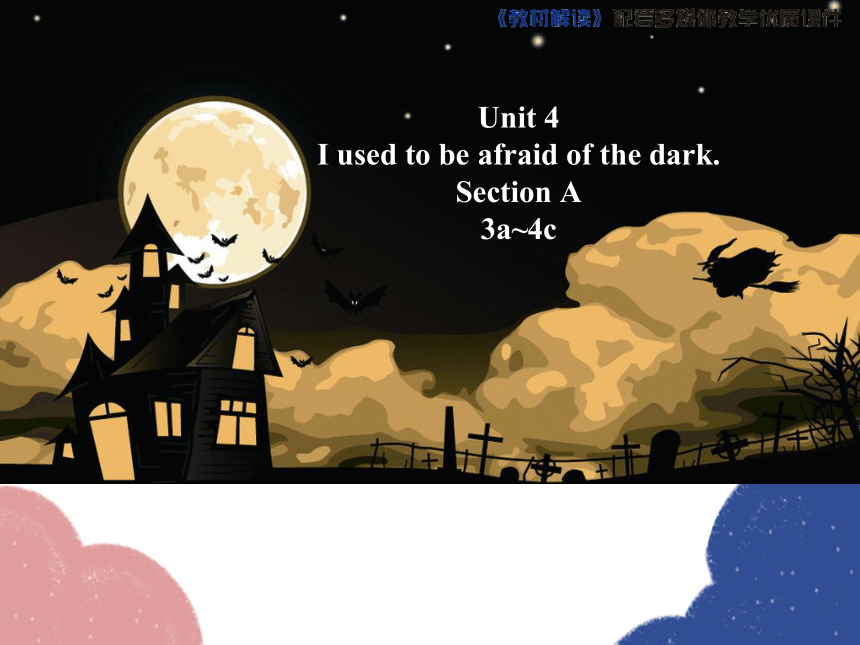 | |
| 格式 | zip | ||
| 文件大小 | 1.0MB | ||
| 资源类型 | 教案 | ||
| 版本资源 | 人教新目标(Go for it)版 | ||
| 科目 | 英语 | ||
| 更新时间 | 2022-12-01 17:19:39 | ||
图片预览

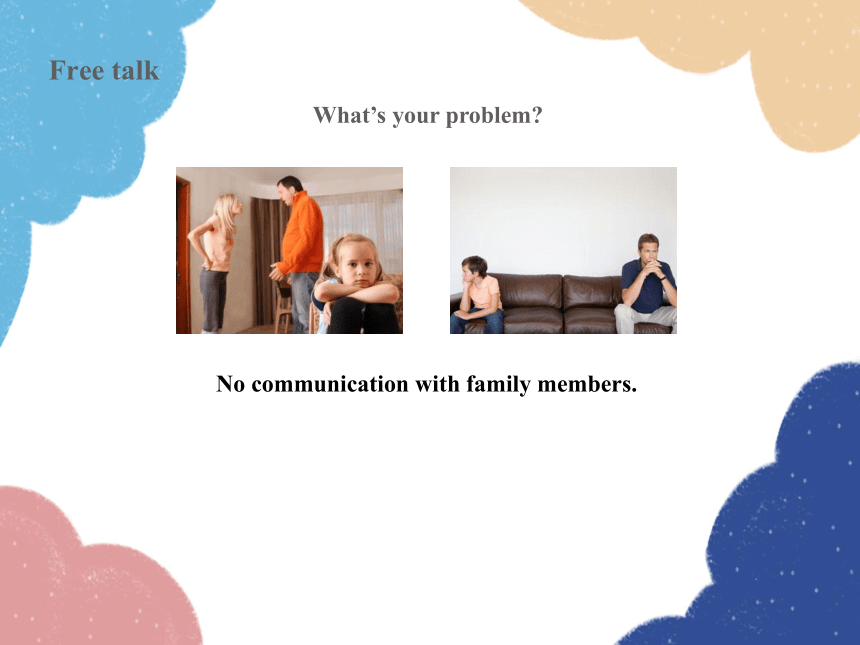
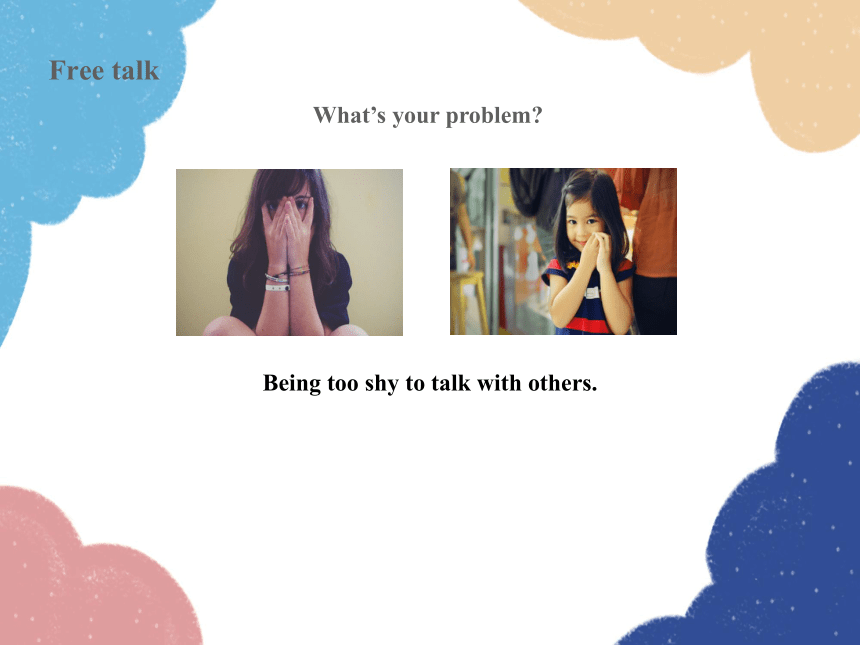
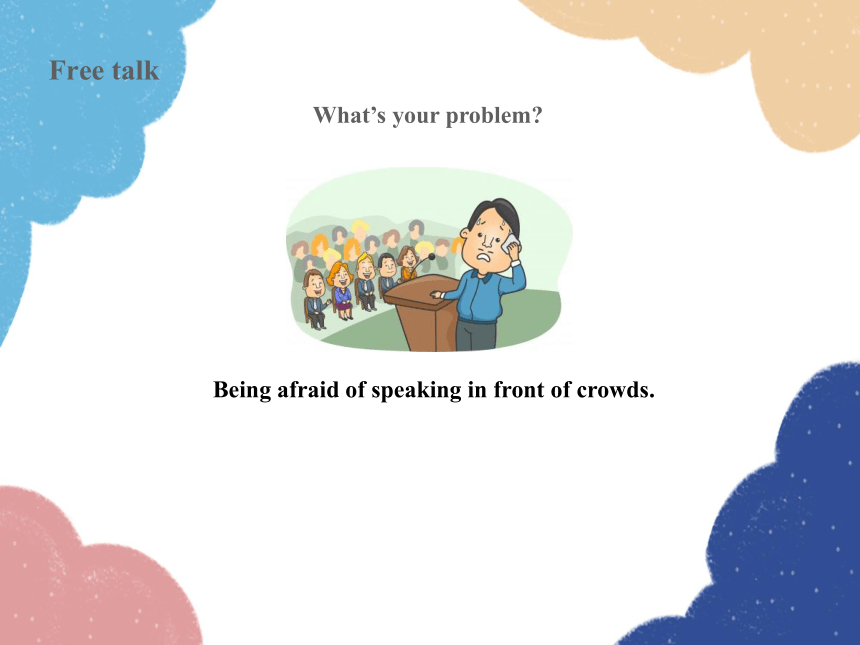
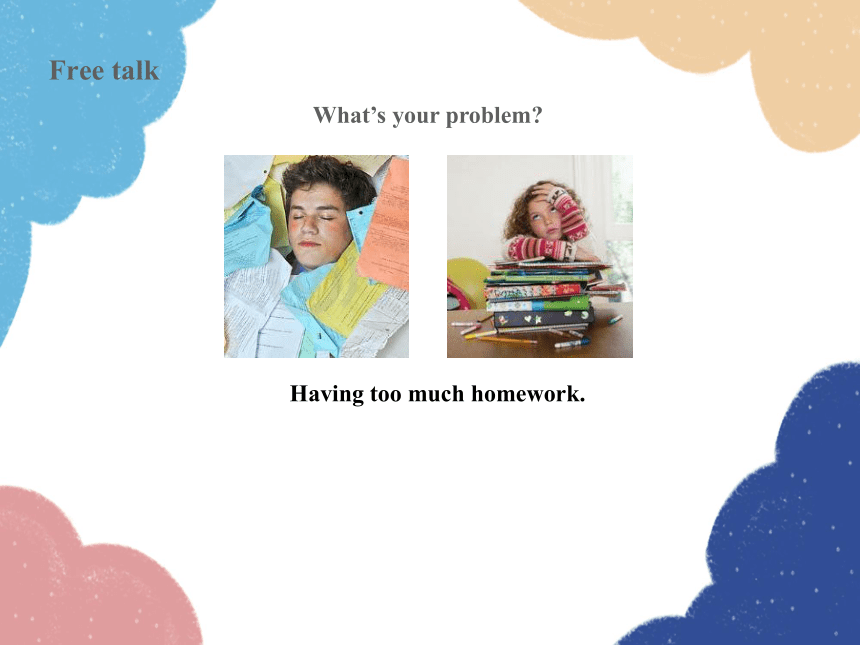


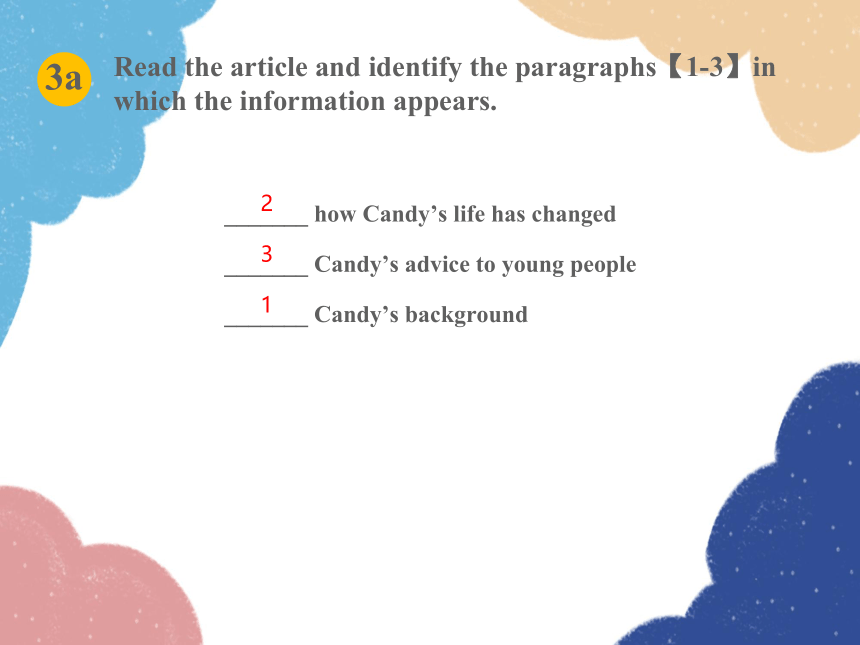
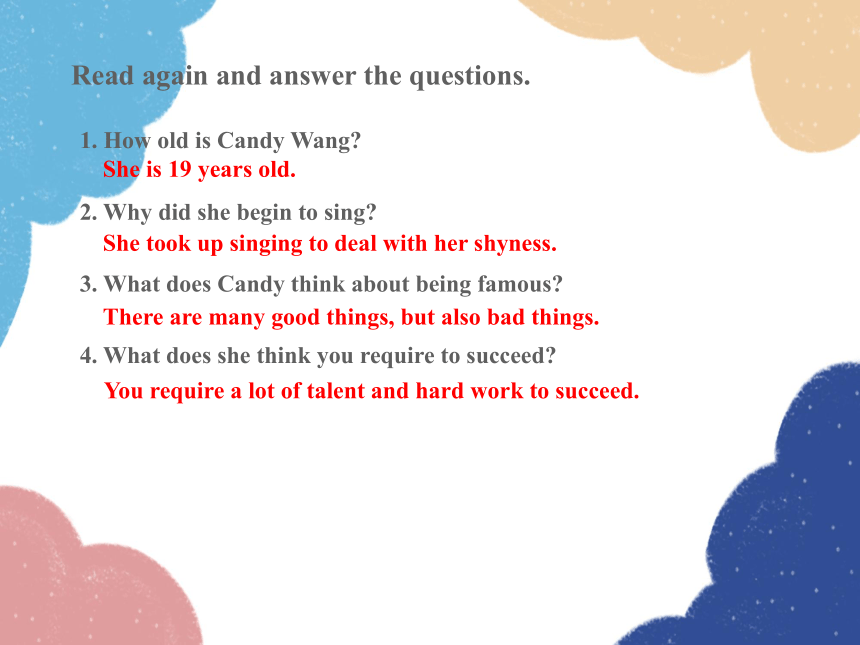
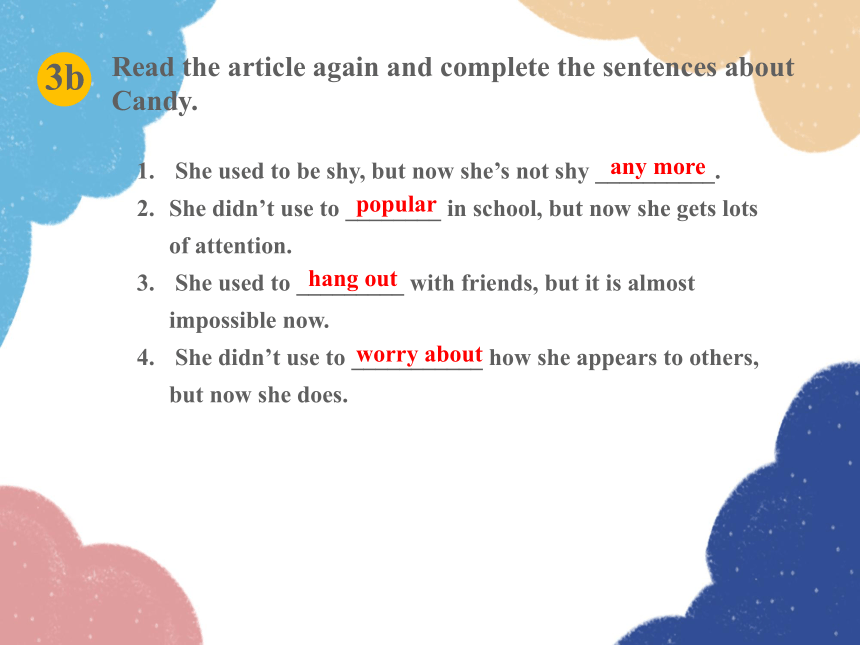

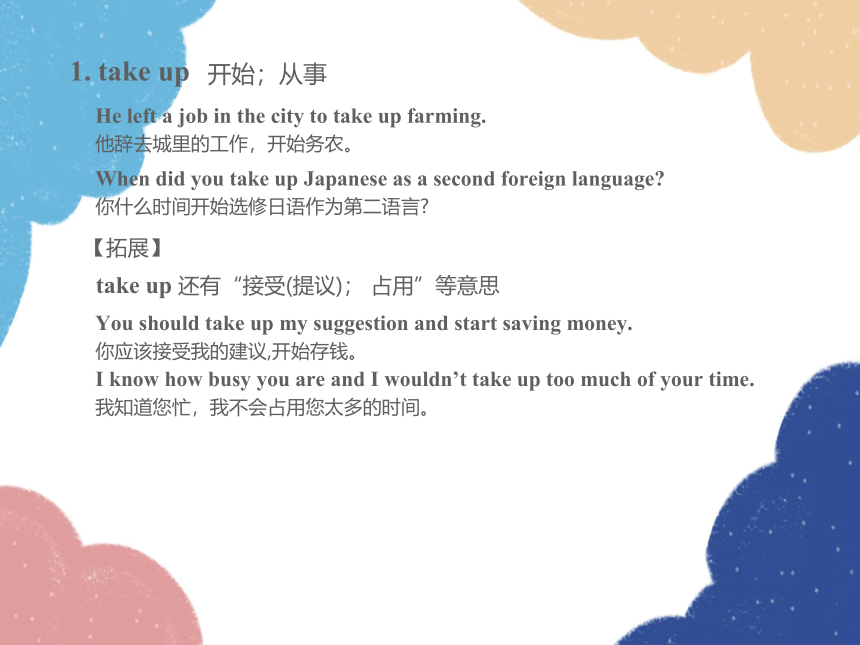
文档简介
(共34张PPT)
Unit 4
I used to be afraid of the dark.
Section A
3a~4c
Free talk
What’s your problem
No communication with family members.
Free talk
What’s your problem
Being too shy to talk with others.
Free talk
What’s your problem
Being afraid of speaking in front of crowds.
Free talk
What’s your problem
Having too much homework.
Free talk
What’s your problem
Having no time to play.
Free talk
What’s your problem
I can’t get well with others.
3a
Read the article and identify the paragraphs【1-3】in which the information appears.
_______ how Candy’s life has changed
_______ Candy’s advice to young people
_______ Candy’s background
1
2
3
Read again and answer the questions.
1. How old is Candy Wang
2. Why did she begin to sing
3. What does Candy think about being famous
4. What does she think you require to succeed
She is 19 years old.
She took up singing to deal with her shyness.
There are many good things, but also bad things.
You require a lot of talent and hard work to succeed.
3b
Read the article again and complete the sentences about Candy.
She used to be shy, but now she’s not shy __________.
She didn’t use to ________ in school, but now she gets lots of attention.
She used to _________ with friends, but it is almost impossible now.
She didn’t use to ___________ how she appears to others, but now she does.
any more
popular
hang out
worry about
Free talk
What can we learn from Candy to deal with our problems
1. take up
开始;从事
He left a job in the city to take up farming.
他辞去城里的工作,开始务农。
When did you take up Japanese as a second foreign language
你什么时间开始选修日语作为第二语言
take up 还有“接受(提议); 占用”等意思
【拓展】
You should take up my suggestion and start saving money.
你应该接受我的建议,开始存钱。
I know how busy you are and I wouldn’t take up too much of your time.
我知道您忙,我不会占用您太多的时间。
Jacky’s mother was surprised to see her son ______ all the food on the table quickly.
A. eat up B. look up
C. take up D. give up
练一练
假如你想从事这项工作,你必须先接受三个月的训练。(take up)
If you want to take up this job, you must first receive three months’ training.
有关take的短语
take off 脱掉;起飞 take away 拿走
take in 吸收,领会 take office 就职
take down 记录;取下 take back 收回
take out 带出;清除
take charge of 负责…
take sth. for granted 认为…是理所当然的
take hold of 抓住…
take pride in 以…为自豪
take the place of 代替…
take turns to do 轮流做…
练一练
The plane will ______ from Beijing Capital Airport and land in London.
A. take up B. take out
C. take away D. take off
2. deal with
处理,对付
I have a matter of importance to deal with.
我有要事要处理。
Have you got any good idea about how to deal with this difficulty
处理这种困难你有什么好想法吗?
【拓展】
do with 和 deal with
do with常与连接代词what连用,而deal with常与连接副词how连用。
I don’t know how they deal with the problem.
= I don’t know what they do with the problem.
我不知道他们如何处理这个问题。
练一练
你怎么处理那台旧电视的?(两种翻译)
How did you deal with the old TV set
What did you do with the old TV set
— ________ did you ________ your pocket money
— I sent it to the children in Sichuan.
A. What; deal with B. How; do to
C. What; deal to D. How; deal with
3. dare
dare用作实义动词时,有时态和人称的变化,用do、does或did来构成否定句或疑问句。
Go ahead and dive if you dare. 如果你敢,尽管跳下水去。
She did not dare to look at him. 她不敢朝他看。
【拓展】
dare用作情态动词, 一般用于疑问句、否定句或条件句, 或与 hardly, never, no one, nobody 等连用。有时态变化,但没有人称形式的变化, 其后接动词原形。构成疑问句和否定句时不用助动词do。
How dare you ask me such a question 你怎敢问我这样的问题
We dare not look at her eyes. 我们不敢看她的眼睛。
练一练
I _______ you because I thought I must be wrong.
A. dare not ask B. dare not to ask
C. dare not asking D. dare to not ask
她晚上不敢一个人出去。 (两种翻译)
She dare not go out alone at night.
She doesn’t dare to go out alone at night.
4. in front of
在......的前面
There is a little child in front of the house.
房子前有一个小孩。
【辨析】
in front of 和 in the front of
in front of : 在……前面,强调在某一物体外部的前面。
in the front of :在…… 的前部,强调在某一物体内部的前面
5. not anymore
= no more 意为“不再”
He doesn't come late anymore. = He no more comes late.
他不再迟到了。
6. tons of
很多的,大量的
tons of 是英语中一种夸张的表达方式,ton的本义为“吨”。
He has been late for school tons of times.
他上学屡次迟到。
7. get…attention
得到/引起…注意
He tried to get the attention of a passing policeman.
他试图引起一位路过的警察的注意。
8. prepared
adj. 准备好的,愿意的
He was prepared to leave the country.
他打算离开这个国家。
Hope for the best but be prepared for the worst.
抱乐观的希望,作最坏的准备。
【拓展】
be prepared, be ready 区别
1. be ready表示具备做某事的条件、处于可以做某事的状态, 或有思想准备, 乐于做某事。
He was always ready to help his friends.
2. be prepared除强调为做某事而进行了积极的努力外, 还常常用来强调精神上有应付意想不到的事件的能力。
The student was thoroughly prepared for the examination.
9. give up
放弃
give up 后面可以接名词或动词-ing形式作宾语。
I wish I could give up drinking.
我真希望自己能戒酒。
give up是动副短语, 如果宾语是名词, 既可以将其放在give与up的中间, 也可以放在give up的后面。
We won’t give up this project. = We won’t give this project up.
我们不会放弃这项工程。
如果宾语是代词, 则必须将其放在give与up之间。
Don’t give him up. 不要放弃他。
有关give的短语
give out 分发, 散发
give way 撤退, 让路
give over 交出,移交
give away 赠送,送出
give in 屈服,投降
give back 归还,送回
give off 散发(光、气味等)
--- I find it difficult to learn English well. I
want to drop it.
--- English is very important in our daily life.
Never _______.
A. give up it B. give it up
C. give away it D. give it away
练一练
10. require
v. 需要;需求
The teacher requires us that we must read English every morning.
老师要求我们每天早晨读英语。
The house requires painting.
这房子需要刷漆。
This question requires a good deal of special study.
这个问题需要作大量的专门研究。
requirement n. 要求;必要条件
【拓展】
ask, beg, demand, require, request 均有“要求,请求”之意。
ask最普通用词,指向对方提出要求或请求,长、晚辈,上下级之间都可使用。
beg指恳切地或再三地请求或要求,常含低三下四意味,也多用于应酬场合。
require强调根据事业、需要或纪律、法律等而提出的要求。
request正式用词, 指非常正式、有礼貌的请求或恳求, 多含担心因种种原因对方不能答应的意味。
练一练
--- Mr. Li, I can’t understand everything in class.
--- Don’t worry! I’ll ________ the main points at the end.
A. record B. review
C. require D. remember
11. make it
make it 在口语当中相当于 succeed,表示“成功、做到、说定、赶上、及时到达”。
I will never make it to a morning class.
早上的课程我总是来不及去上。
I wondered if I would make it to the other side.
我怀疑自己是否能跑到对面。
Grammar focus
I used to be short.
I didn’t use to be popular in school.
Paula used to be really quiet.
You used to be short, didn’t you
Did you use to wear glasses
She didn’t use to like tests.
Yes, I did. / No, I didn’t.
Yes, he did. / No, he didn’t.
4a
Write sentences about the past using used to.
1. Grace/ watch a lot of TV/ watch a lot of movies
2. my mom/ have curly hair/ have straight hair
3. Jerry/ read books on European history/ read books on African culture
4. Sandy/ teach British English/ teach American English
Grace used to watch a lot of TV. She didn’t use to watch a lot of movies.
My mom used to have curly hair. She didn’t use to have straight hair.
Jerry used to read books on European history. He didn’t use to read books on African culture
Sandy used to teach British English. She didn’t use to teach American English.
4b
Look at the information and write sentences about Emily.
4c
Which of these things did you use to be afraid of Which ones are you still afraid of Check the boxes and then ask your partner.
Homework
老师可以在这里布置作业噢~
Unit 4
I used to be afraid of the dark.
Section A
3a~4c
Free talk
What’s your problem
No communication with family members.
Free talk
What’s your problem
Being too shy to talk with others.
Free talk
What’s your problem
Being afraid of speaking in front of crowds.
Free talk
What’s your problem
Having too much homework.
Free talk
What’s your problem
Having no time to play.
Free talk
What’s your problem
I can’t get well with others.
3a
Read the article and identify the paragraphs【1-3】in which the information appears.
_______ how Candy’s life has changed
_______ Candy’s advice to young people
_______ Candy’s background
1
2
3
Read again and answer the questions.
1. How old is Candy Wang
2. Why did she begin to sing
3. What does Candy think about being famous
4. What does she think you require to succeed
She is 19 years old.
She took up singing to deal with her shyness.
There are many good things, but also bad things.
You require a lot of talent and hard work to succeed.
3b
Read the article again and complete the sentences about Candy.
She used to be shy, but now she’s not shy __________.
She didn’t use to ________ in school, but now she gets lots of attention.
She used to _________ with friends, but it is almost impossible now.
She didn’t use to ___________ how she appears to others, but now she does.
any more
popular
hang out
worry about
Free talk
What can we learn from Candy to deal with our problems
1. take up
开始;从事
He left a job in the city to take up farming.
他辞去城里的工作,开始务农。
When did you take up Japanese as a second foreign language
你什么时间开始选修日语作为第二语言
take up 还有“接受(提议); 占用”等意思
【拓展】
You should take up my suggestion and start saving money.
你应该接受我的建议,开始存钱。
I know how busy you are and I wouldn’t take up too much of your time.
我知道您忙,我不会占用您太多的时间。
Jacky’s mother was surprised to see her son ______ all the food on the table quickly.
A. eat up B. look up
C. take up D. give up
练一练
假如你想从事这项工作,你必须先接受三个月的训练。(take up)
If you want to take up this job, you must first receive three months’ training.
有关take的短语
take off 脱掉;起飞 take away 拿走
take in 吸收,领会 take office 就职
take down 记录;取下 take back 收回
take out 带出;清除
take charge of 负责…
take sth. for granted 认为…是理所当然的
take hold of 抓住…
take pride in 以…为自豪
take the place of 代替…
take turns to do 轮流做…
练一练
The plane will ______ from Beijing Capital Airport and land in London.
A. take up B. take out
C. take away D. take off
2. deal with
处理,对付
I have a matter of importance to deal with.
我有要事要处理。
Have you got any good idea about how to deal with this difficulty
处理这种困难你有什么好想法吗?
【拓展】
do with 和 deal with
do with常与连接代词what连用,而deal with常与连接副词how连用。
I don’t know how they deal with the problem.
= I don’t know what they do with the problem.
我不知道他们如何处理这个问题。
练一练
你怎么处理那台旧电视的?(两种翻译)
How did you deal with the old TV set
What did you do with the old TV set
— ________ did you ________ your pocket money
— I sent it to the children in Sichuan.
A. What; deal with B. How; do to
C. What; deal to D. How; deal with
3. dare
dare用作实义动词时,有时态和人称的变化,用do、does或did来构成否定句或疑问句。
Go ahead and dive if you dare. 如果你敢,尽管跳下水去。
She did not dare to look at him. 她不敢朝他看。
【拓展】
dare用作情态动词, 一般用于疑问句、否定句或条件句, 或与 hardly, never, no one, nobody 等连用。有时态变化,但没有人称形式的变化, 其后接动词原形。构成疑问句和否定句时不用助动词do。
How dare you ask me such a question 你怎敢问我这样的问题
We dare not look at her eyes. 我们不敢看她的眼睛。
练一练
I _______ you because I thought I must be wrong.
A. dare not ask B. dare not to ask
C. dare not asking D. dare to not ask
她晚上不敢一个人出去。 (两种翻译)
She dare not go out alone at night.
She doesn’t dare to go out alone at night.
4. in front of
在......的前面
There is a little child in front of the house.
房子前有一个小孩。
【辨析】
in front of 和 in the front of
in front of : 在……前面,强调在某一物体外部的前面。
in the front of :在…… 的前部,强调在某一物体内部的前面
5. not anymore
= no more 意为“不再”
He doesn't come late anymore. = He no more comes late.
他不再迟到了。
6. tons of
很多的,大量的
tons of 是英语中一种夸张的表达方式,ton的本义为“吨”。
He has been late for school tons of times.
他上学屡次迟到。
7. get…attention
得到/引起…注意
He tried to get the attention of a passing policeman.
他试图引起一位路过的警察的注意。
8. prepared
adj. 准备好的,愿意的
He was prepared to leave the country.
他打算离开这个国家。
Hope for the best but be prepared for the worst.
抱乐观的希望,作最坏的准备。
【拓展】
be prepared, be ready 区别
1. be ready表示具备做某事的条件、处于可以做某事的状态, 或有思想准备, 乐于做某事。
He was always ready to help his friends.
2. be prepared除强调为做某事而进行了积极的努力外, 还常常用来强调精神上有应付意想不到的事件的能力。
The student was thoroughly prepared for the examination.
9. give up
放弃
give up 后面可以接名词或动词-ing形式作宾语。
I wish I could give up drinking.
我真希望自己能戒酒。
give up是动副短语, 如果宾语是名词, 既可以将其放在give与up的中间, 也可以放在give up的后面。
We won’t give up this project. = We won’t give this project up.
我们不会放弃这项工程。
如果宾语是代词, 则必须将其放在give与up之间。
Don’t give him up. 不要放弃他。
有关give的短语
give out 分发, 散发
give way 撤退, 让路
give over 交出,移交
give away 赠送,送出
give in 屈服,投降
give back 归还,送回
give off 散发(光、气味等)
--- I find it difficult to learn English well. I
want to drop it.
--- English is very important in our daily life.
Never _______.
A. give up it B. give it up
C. give away it D. give it away
练一练
10. require
v. 需要;需求
The teacher requires us that we must read English every morning.
老师要求我们每天早晨读英语。
The house requires painting.
这房子需要刷漆。
This question requires a good deal of special study.
这个问题需要作大量的专门研究。
requirement n. 要求;必要条件
【拓展】
ask, beg, demand, require, request 均有“要求,请求”之意。
ask最普通用词,指向对方提出要求或请求,长、晚辈,上下级之间都可使用。
beg指恳切地或再三地请求或要求,常含低三下四意味,也多用于应酬场合。
require强调根据事业、需要或纪律、法律等而提出的要求。
request正式用词, 指非常正式、有礼貌的请求或恳求, 多含担心因种种原因对方不能答应的意味。
练一练
--- Mr. Li, I can’t understand everything in class.
--- Don’t worry! I’ll ________ the main points at the end.
A. record B. review
C. require D. remember
11. make it
make it 在口语当中相当于 succeed,表示“成功、做到、说定、赶上、及时到达”。
I will never make it to a morning class.
早上的课程我总是来不及去上。
I wondered if I would make it to the other side.
我怀疑自己是否能跑到对面。
Grammar focus
I used to be short.
I didn’t use to be popular in school.
Paula used to be really quiet.
You used to be short, didn’t you
Did you use to wear glasses
She didn’t use to like tests.
Yes, I did. / No, I didn’t.
Yes, he did. / No, he didn’t.
4a
Write sentences about the past using used to.
1. Grace/ watch a lot of TV/ watch a lot of movies
2. my mom/ have curly hair/ have straight hair
3. Jerry/ read books on European history/ read books on African culture
4. Sandy/ teach British English/ teach American English
Grace used to watch a lot of TV. She didn’t use to watch a lot of movies.
My mom used to have curly hair. She didn’t use to have straight hair.
Jerry used to read books on European history. He didn’t use to read books on African culture
Sandy used to teach British English. She didn’t use to teach American English.
4b
Look at the information and write sentences about Emily.
4c
Which of these things did you use to be afraid of Which ones are you still afraid of Check the boxes and then ask your partner.
Homework
老师可以在这里布置作业噢~
同课章节目录
- Unit 1 How can we become good learners.
- Section A
- Section B
- Unit 2 I think that mooncakes are delicious!
- Section A
- Section B
- Unit 3 Could you please tell me where the restroom
- Section A
- Section B
- Unit 4 I used to be afraid of the dark.
- Section A
- Section B
- Unit 5 What are the shirts made of?
- Section A
- Section B
- Review of Units 1-5
- Unit 6 When was it invented?
- Section A
- Section B
- Unit 7 Teenagers should be allowed to choose their
- Section A
- Section B
- Unit 8 It must belong to Carla.
- Section A
- Section B
- Unit 9 I like music that I can dance to.
- Section A
- Section B
- Unit 10 You're supposed to shake hands.
- Section A
- Section B
- Review of Units 6-10
- Unit 11 Sad movies make me cry.
- Section A
- Section B
- Unit 12 Life is full of the unexpected
- Section A
- Section B
- Unit 13 We're trying to save the earth!
- Section A
- Section B
- Unit 14 I remember meeting all of you in Grade 7.
- Section A
- Section B
- Review of Units 11-14
